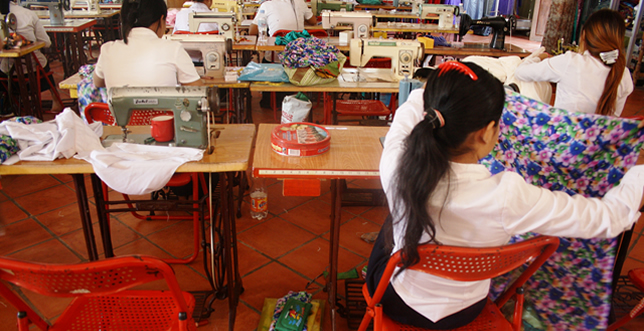Help purchase sewing machines and materials so survivors of human trafficking can develop skills to earn a livelihood.
Why we care: AFESIP vocational skills training centers lack enough sewing materials and machines—which are old and often break down—for trainees to individually practice their skills.
How we’re solving this: Purchasing 30 sewing machines and materials so trainees have more opportunities to improve their skills and increase their employability or success as small business owners in the clothing industry.
Residents at AFESIP have had many of their basic human rights violated and have been subjected to some of the worst forms of exploitation and abuse. The vast majority of survivors of sex trafficking and commercial sexual exploitation living at AFESIP’s rehabilitation centers come from backgrounds of extreme poverty and many have had histories marred by domestic violence or rape even before the event of trafficking took place. Nearly all of our beneficiaries are female and will have struggled against gender–based discrimination most of their lives. Consequently, they are often socially marginalized in their communities and we strive to offer the support, resources and opportunities unavailable to this group.
Along with basic literacy and mathematics courses, the residents can choose between hairdressing, sewing or weaving training, with sewing being the most intensive and popular course. The residents enrolled in sewing training are currently using old sewing machines. Unfortunately, the machines regularly break down, impeding the rate of progress of trainees. We also have a shortage of machines and sewing materials, meaning trainees are working in groups and sharing these items. This arrangement does not allow trainees to maximize their individual practical training time.
This project would help us purchase 30 new sewing/embroidery machines and other materials that help trainees practice more and with fewer disruptions due to broken down machines and the need to fix them. 12 machines will be for our rehabilitation center in Phnom Penh, 12 for Siem Reap and 6 for Kampong Cham. Some of the sewing materials we’ll purchase include fabric, sewing needles, hand needles, overlocked machine needles, wooden meter stick ruler, metric waist-to-hip tape, tailor chalk, thread, zippers, hooks, safety pins, and catalog books for sewing skills.
Adequate time and quality of practice will help survivors build skills and reintegrate into their communities with viable knowledge and confidence in themselves and their ability to earn a livelihood by starting a business or working in shops. Becoming financially independent and earning sustainable incomes to support their families allows our residents the ability to break the cycle of poverty and vulnerability that leaves so many susceptible to trafficking and abuse.
 AFESIP is supported by the Kering Foundation, which combats violence against women and promotes their empowerment. Launched in January 2009, the Foundation supports community-based projects and encourages employee involvement to sustain women’s causes around the world. Through four programmes, it supports local and international NGOs as well as social entrepreneurs, helps raise awareness and establishes joint projects with the Kering brands. In 2012, more than 80,000 women benefited from its support in 16 countries. *In line with PPR’s change of name, the PPR Corporate Foundation for Women’s Dignity and Rights will become the Kering Corporate Foundation, subject to approval at the Foundation’s board meeting on 26 June 2013. www.keringfoundation.org @KeringForWomen
AFESIP is supported by the Kering Foundation, which combats violence against women and promotes their empowerment. Launched in January 2009, the Foundation supports community-based projects and encourages employee involvement to sustain women’s causes around the world. Through four programmes, it supports local and international NGOs as well as social entrepreneurs, helps raise awareness and establishes joint projects with the Kering brands. In 2012, more than 80,000 women benefited from its support in 16 countries. *In line with PPR’s change of name, the PPR Corporate Foundation for Women’s Dignity and Rights will become the Kering Corporate Foundation, subject to approval at the Foundation’s board meeting on 26 June 2013. www.keringfoundation.org @KeringForWomen


